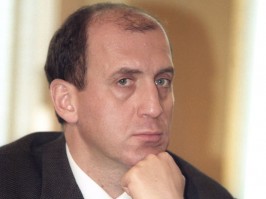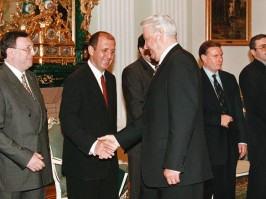Adrian Humphreys | 13/03/05 | Last Updated: 13/03/05 8:48 PM ET
 For 20 years, Vitaly Malkin has eyed Canada, applying to live here and seek citizenship, investing millions in Toronto real estate.
For 20 years, Vitaly Malkin has eyed Canada, applying to live here and seek citizenship, investing millions in Toronto real estate. One evening last fall in the Parliament Hill office of a Canadian senator, a group of influential Canadians met with a controversial Russian oligarch bearing an intriguing offer: to help reveal the fate of Raoul Wallenberg, the Swedish diplomat hailed as a hero for saving tens of thousands of Jews during the Holocaust, before he disappeared in Soviet custody.
Two bodyguards stood outside Conservative Senator Linda Frum’s office watching over Vitaly Malkin, founder of a private national bank, once listed as one of the world’s wealthiest people and a member of the Russian senate.
Inside, Mr. Malkin and Ms. Frum were joined by Liberal MP and former justice minister Irwin Cotler, who brought with him Mr. Wallenberg’s niece, Louise von Dardel. Charles Wagner, Mr. Malkin’s Toronto lawyer, and Moshe Ronen, vice-president of the World Jewish Congress, were also there, all of them looking to Mr. Malkin to pry the Wallenberg secret from KGB archives.
Despite a whiff of Hollywood thriller about the after-hours gathering, it likely seemed entirely normal to Mr. Malkin, whose life is writ against a backdrop of international intrigue, precipitous geopolitics, high-level access and massive financial deals.
For 20 years, Mr. Malkin has eyed Canada, applying to live here and seek citizenship, investing millions in Toronto real estate.
Immigration rejection, RCMP probes, secret notations about him with Canada’s spy agency, accusations of organized crime ties, court battles with the government and lawsuits with former business partners have been his reward.
His November visit can be seen as something of a triumph, as it meant overcoming a 19-year ban on entering Canada for alleged involvement in organized crime, an accusation he steadfastly fought as unfair and baseless. Mr. Malkin, never charged with a crime, says he is a victim of Western prejudice against Russia’s business elites, with an assumption that their wealth comes from mobsters or corruption.
However, Mr. Malkin also found that not everything about his past was forgotten when he again crossed the Canadian border.
This summer he raised international ire when he led a delegation to Washington to defend Moscow against accusations of human-rights abuses in the 2009 death of Russian accountant Sergei Magnitsky, which has become a global cause célèbre and a source of significant diplomatic friction between the U.S. and the Kremlin.
It all left Mr. Cotler and Ms. Frum telling the National Post they regret the meeting with Mr. Malkin, with Mr. Cotler now wondering if, by offering help on the Wallenberg mystery, Mr. Malkin: “felt this was a way to perhaps sanitize his reputation.”
On Nov. 21, 2012, Mr. Cotler was hosting Ms. von Dardel, Mr. Wallenberg’s niece, during her visit to Ottawa. They shared a stage that evening with Jason Kenney, the immigration minister, at the opening of a Wallenberg exhibit at the Canadian War Museum. Wallenberg — who issued bogus Swedish passports to protect an estimated 100,000 Jews in Hungary from Nazi death camps — was arrested in 1945 by the invading Red Army and disappeared. He is presumed to have died in Soviet custody; how, when and why remains a mystery, but his legacy is celebrated as much in Canada as anywhere: He was named Canada’s first honorary citizen in 1985 and, in January, Canada Post issued a commemorative stamp in his honour.
“I don’t really know very much about him,” Ms. Frum said, when asked about the meeting with Mr. Malkin. “I simply took at face value that he was a member of the Russian legislature and therefore potentially somebody of influence and potentially somebody who could help solve this important Jewish mystery, this moral mystery that is of great emotional significance.”
Added Mr. Cotler: “[Mr. Malkin] said that sometimes people go through official channels and don’t get anywhere but he had — quote — ‘informal’ channels that he could go through and that he believed that he could, in fact, get us some information with respect to Wallenberg.”
For his part, Mr. Malkin declined to divulge details about the meeting. “I did indeed have a discussion about Raoul Wallenberg — but the sensitive nature of the case precludes me from offering any additional details,” Mr. Malkin said in an e-mail interview.
It wasn’t until afterwards that Mr. Cotler and Ms. Frum learned more about the friendly Russian senator, they both said.
 Former Russian President Boris Yeltsin, centre right, shakes hands with Vitaly Malkin, former head of the Rossiyskiy Kredit Bank, at a meeting with Russia’s most powerful businessmen in the Kremlin in Moscow, in this June 2, 1998 photo.
Former Russian President Boris Yeltsin, centre right, shakes hands with Vitaly Malkin, former head of the Rossiyskiy Kredit Bank, at a meeting with Russia’s most powerful businessmen in the Kremlin in Moscow, in this June 2, 1998 photo. Mr. Cotler said it became clear that “I didn’t want to have anything further to do with him.” Ms. Frum said it was “wrong to seek help down this avenue.” Mr. Ronen said he is just looking to solve the Wallenberg mystery and has no involvement in political concerns. Mr. Wagner declined to discuss it. Later, Ms. Frum added: “If Russia were an exemplary democracy, these files would have been opened long ago. But those of us who want truth in the Wallenberg matter must deal with Russia as it is, not as we would like it to be.”
